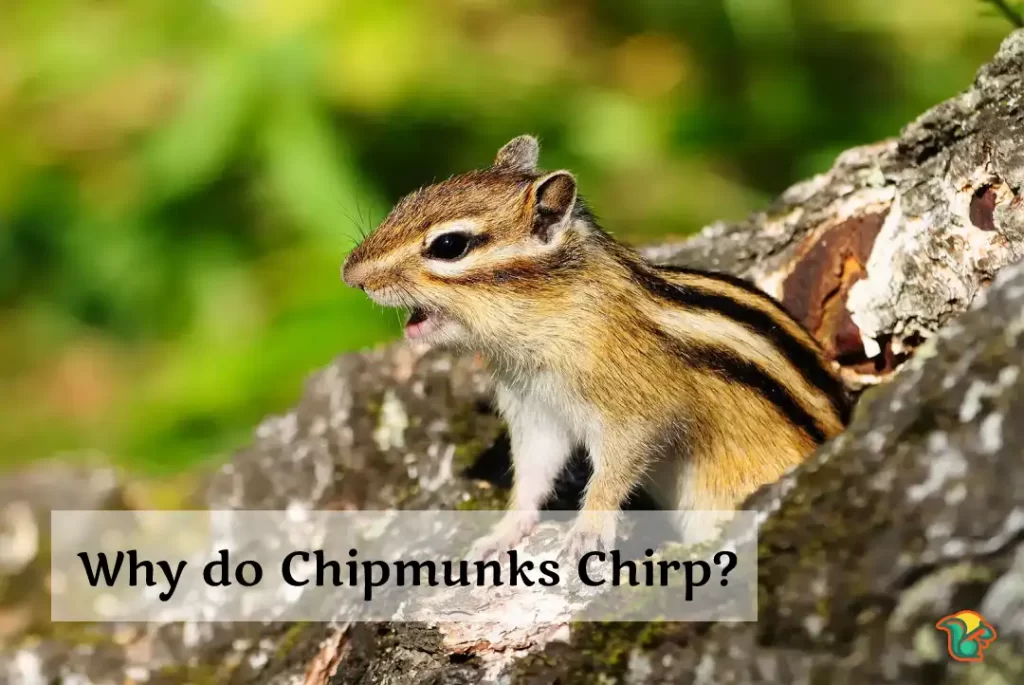Why do Chipmunks Chirp? [Why and When]
Is the chirping noise you are listening is from a bird? We often mistake the chipmunk’s chirp as the bird’s chirp. They sound similar but we don’t know much about the chipmunk’s calls. Today, we will discuss the chipmunks’ calls including the chirp-chirp one!
So, why do chipmunks chirp and when? Is it their mating call or it’s just to be social? Are they warning anybody or they are just playing with each other? We have it all listed here!

The Reason Behind Chipmunks Chirp
People that are interested to know about mammals like rodents love chipmunks. This brings us to the sounds that chipmunks make. So, what sounds does a chipmunk make? Well, there is not only one type of noise that these animals make.
You might have heard them chirping. Along with the chirp-chirp sound, they also shout out chuck-chucks at times. And yes, they trill too! These chubby cheeks with bushy tails cuties have 25 different species but most of them are found in North America.
However, Siberian chipmunks, as the name says, reside in Siberia. But regardless of the place they live, they make almost the same sorts of noises. Their chirping sound is the reason behind their name. They were called “chip squirrels or “chipminks” at times for their “chirp-chirp” or “chip-chip” sounds.
But not many people are familiar with the sound. It’s because these animals do not make noise often. We all know that they live alone and they are not much social. But if you are concerned about their communication, then let us tell you, chipmunks communicate among their species.
The Reason Behind Chipmunks Chirping
Now that we have cleared that the chirping sound you hear from the yard is from a chipmunk, you might ask why they chirp.
The very common reason that the researchers have come up with the chirping sound is it is a “warning” sound. As we know, chipmunks are not social- both among their species, other species, and human. To know more about chipmunks and the babies take a look at when do chipmunks have babies!
They live alone and to get their food, they have to be smart enough to avoid the predators. Though they are not social to their species, they still communicate. And to keep their own species out of danger, when they see predators or any danger coming- they alert the others.
If there is any predator in the vicinity impending danger, they try to chirp and warn others so that they can hide and safeguard themselves. And as a warning sound, the “chirp-chirp” or “chip-chip” is used the most.
They produce this sound in a high-pitched frequency so that even if others are away, they can listen to it and act upon the warning. If you have never heard of the chipmunks chirping, follow the bird’s chirp. They are quite similar to each other.
If you are tired of listening to the noise and want to know how to stop chipmunks from chirping- we have nothing else to tell you without suggesting you remove it! Yes, get rid of it- there’s no other way!
Predators and Chipmunk’s Chirp
Mostly, the chirping sound is related to the predators like a raccoon or a cat. Also, if they see a coyote near, they make this call to inform others. They may not live together but they have the responsibility of warning their species of the impending threat.
According to the research, chipmunks chirp when there is a mammalian predator. However, other researchers have also shown that they can chirp if there is an aerial predator too. Now, you might ask why you listen to chirping in the morning.
Why do chipmunks chirp in the morning more than the other times of the day? A reasonable explanation for this fact can be easy. These rodents mostly get out for feeding themselves in the dusk and dawn. When it is dusk, there is barely any light.
Though they have good eyes, if there is any predator- it is easy to hide for it to hide for the chipmunk. Unlike dusk, in the dawn, there is light. And so, chipmunks can see almost everything including the predators (if there is any.) And so, they start chirping to warn others of the threat. This is why they chirp the most in the morning!
Chirping and the Response
According to studies, the researchers have also noted the reaction of the chirping sound. As we have discussed chirping refers to a warning- what do you think the other chipmunks do hearing the sound? In the case of the Eastern chipmunks, the behavior changes immediately.
They change the foraging behavior if they listen to another chipmunk chirping. Such animals tend to be more vigilant after listening to the alarm. Also, they tend to reduce their load size if they listen to this noise. And after they have listened to this, they try to spend more time inside their burrows.
These animals don’t get out soon when they hear the chirps. If you want to know more about their burrows and nesting preferences, check out “where do chipmunks nest!” This refers that these rodents believe in each other and so, they become alert of the predators.
In the process, they will collect less food to safeguard themselves. Talking about food and feeding the chipmunks, you might want to know about hibernation. When do chipmunks come out of hibernation– we have the details listed here!
Clucking vs. Chirping
So, do chipmunks only make chirping sounds? No, we have told you before, they have other calls too. And a very common among them is the clucking sound. Have you ever heard an ax hitting the wood? Or you might have heard a horse’s hooves striking any wooden bridge or any other wood surface. This is what the clucking sound feels like.
Compared to chirping, the clucking sound has a lower frequency. Why do chipmunks make a clucking sound and when do they do it? Well, just like chirping, it is also related to warnings regarding the predators. Mostly, when a chipmunk sees a predator, it can cluck.
But in this case, they will only cluck if it is an aerial predator. They can chirp in any season but clucking is mostly heard in the fall. In the summer, this is not heard often. In the fall, the leaves fall off from the trees.
As a result, there is a clear view of the sky. During this period, they can see the aerial predator. No matter it is a hawk, raptor, or a day-hunting owl, they will make the clucking call.
Period of Chirping
So, how long does a chipmunk chirp? Well, this sound will contain a series of notes. This will be repeated over and over. Mostly, when you see a chipmunk chirping to warn others regarding a threat, it will be a few seconds long.
But in some cases, people have also seen chipmunks chirping for a long period. Yes, they can chirp for a few minutes in some situations. In the case of the Eastern chipmunks, the chipping sounds are emitted at a frequency of close to 2.8 to 9.6 kHz.
The frequency can vary according to the situation. So, do the Western chipmunks make the same chirping sound? Yes, the western chipmunks are seen chirping too. But when it comes to the Western chipmunks chirping, the noise will have more high notes than low compared to the Eastern chipmunks’ chirps.
No matter it’s chirping or clucking, if there is a high risk, they can make noise for 30 minutes or more! But why do chipmunks chirp all day long? For the same reason, if they fear a predator, they keep warning others continuously.




